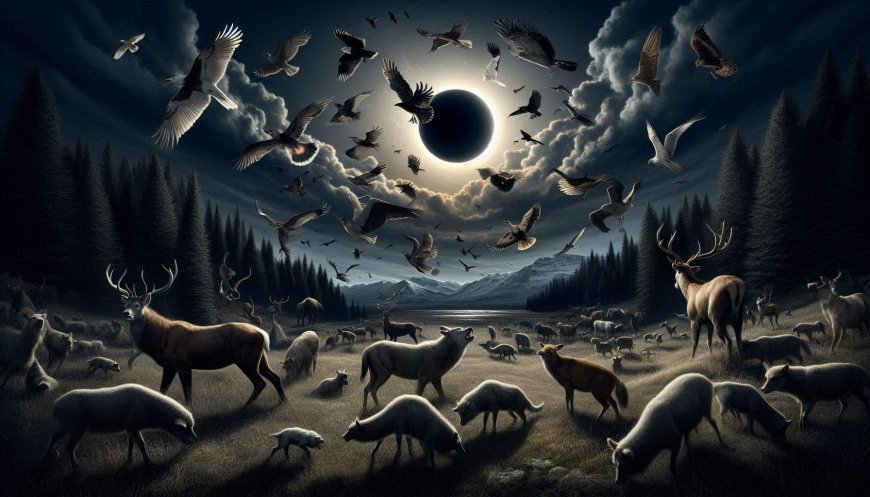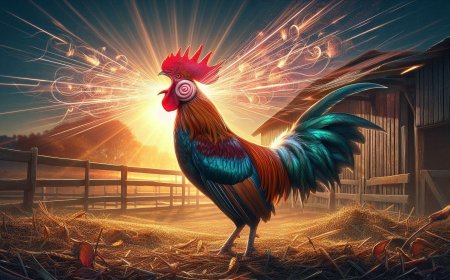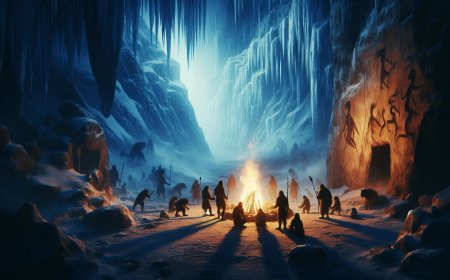Shadows in the Sky: How Animals React to Solar Eclipses
Explore how animals react to solar eclipses in this fascinating image showcasing various species responding to the sudden darkness as the moon casts its shadow across the sky during an eclipse.

Eclipses have always fascinated humanity, but what happens when the world’s creatures experience this rare cosmic event? As the moon’s shadow blankets the Earth, plunging day into sudden darkness, animals respond in extraordinary ways. From the largest mammals to the smallest insects, the behavior of animals during a solar eclipse is as mysterious and captivating as the phenomenon itself.
A Rare Celestial Event
A total solar eclipse, where the moon completely obscures the sun, is an infrequent visitor. In any given spot, it may only occur once every 375 years, making it a once-in-a-lifetime experience for many generations of creatures. For animals, who rely heavily on their natural routines and environmental cues, this sudden disruption of light and shadow can trigger unexpected behaviors.
The Four Categories of Animal Responses
Scientists have closely observed how animals react to eclipses, and their responses can be broadly divided into four categories:
- Evening Behaviors: Many animals mistakenly interpret the eclipse as the onset of night. Birds return to their nests, nocturnal creatures stir, and daytime animals become quiet, mirroring their usual twilight routines.
- Apparent Anxiety: For some, the eclipse brings a sense of unease. Animals like baboons, giraffes, and birds often display signs of distress or confusion in response to the sudden darkness.
- Novel Responses: In some rare cases, animals exhibit unusual behavior never seen during normal day or night cycles. Reptiles, like the Galapagos tortoise and Komodo dragon, may become more active than usual, defying their typically slow-paced nature.
- No Observable Change: Some animals, however, seem to continue unaffected. They carry on with their activities as though nothing strange is happening at all.
A Zoo in Eclipse: The Riverbanks Study
A remarkable study conducted at Riverbanks Zoo during the 2017 solar eclipse shed light on this phenomenon. Seventeen species, including mammals, birds, and reptiles, were carefully observed, and 75% of them showed noticeable changes in their behavior.
The most common reaction was the initiation of evening routines. Eight out of 13 species that displayed changes began behaving as though night had fallen. Birds nestled down, and nocturnal animals became more active. Anxiety also appeared in a handful of species—baboons, gorillas, giraffes, and flamingos all showed signs of stress as the light dimmed unexpectedly.
Curiously, reptiles like the Galapagos tortoise and Komodo dragon reacted differently. They became more animated, in stark contrast to their usual slow, deliberate movements, marking this as a rare instance of novel behavior.
Eclipses Through History: Animal Reactions Across Time
History offers some fascinating glimpses into how animals have responded to solar eclipses across the world. During the 1932 eclipse in New England, a wide range of species—from insects to large mammals—exhibited their usual nighttime behaviors as darkness fell.
In other cases, anxiety reigned. Dogs stopped barking, horses paced nervously, and birds froze mid-flight, falling silent. Primate species have offered especially intriguing insights. Rhesus macaques in India broke off into smaller groups and fell asleep during an eclipse, while chimpanzees at a zoo in Georgia climbed high into structures and stared at the sky, seemingly aware of the cosmic event.
Yet not all animals react dramatically. Some reports from India and Zimbabwe describe species like lions, rodents, and various birds that displayed no noticeable behavioral shifts during eclipses, seemingly unfazed by the fleeting darkness.
A Spectrum of Reactions
Animal reactions to solar eclipses range from pronounced changes to subtle or non-existent responses. While the sudden darkening of the sky may trigger evening behaviors in many animals, anxiety in some, and novelty in others, the unpredictability of these responses remains an enigma.
In these brief moments of celestial wonder, we witness not just the marvel of the cosmos, but also a reflection of the intricate and varied ways animals perceive and adapt to their ever-changing environment. As scientists continue to observe these rare events, each eclipse deepens our understanding of the mysterious interplay between nature and the stars.
What's Your Reaction?









































































































